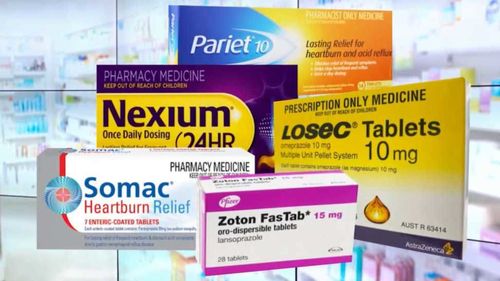Eye group action research on drugs used by millions of Aussies
When Donna Johnstone first suffered from reflux disease more than 20 years ago, her doctor gave her a prescription for a medicine he assured her would fix it.
And, to his surprise, it happened, Johnstone said.
The mother, from the NSW Central Coast, started taking Somac, a type of proton pump inhibitor (PPI) that works by reducing the amount of acid in the stomach.
“It helped the reflux, it was great,” he said.
“I didn’t have any symptoms or anything, which was great for that.”
Johnstone continued to take the medication for the next two decades, until he started having serious health problems with his kidneys around 2018.

“I ended up with a lot of kidney stones,” he said.
“Well, my doctor was doing routine blood tests, and one of them showed that my kidney function was down to 19 percent.”
Johnstone said he was surprised to hear his kidney function was so low, as he had no symptoms.
“I had no side effects at all, absolutely,” he said.
“If I hadn’t had those regular blood tests, I would have ended up on dialysis, because when your kidney function drops to 15 percent they put you on dialysis.”
When he saw a specialist, the doctor advised Johnstone that his kidney failure was caused by the heart attack medication.
“He said this was because of Somac. Then he said, ‘No more Somac’,” he said.

Proton pump inhibitors like Somac have been prescribed since the early nineties because of their effectiveness in treating heartburn and reflux.
But now there is the fact that proton pump inhibitors can increase the risk of kidney problems and colon cancer.
Pharmaceutical giant AstraZeneca settled a US lawsuit late last year, paying $630 million to nearly 19,000 patients who claimed two proton pump inhibitors – Nexium and Prilosec (sold as Losec in Australia ) – caused their chronic kidney disease.
Shine Lawyers is already investigating proton pump inhibitors that are available here in Australia, including Nexium, Losec, Somac, Pariet and Zoton for a possible lawsuit against the manufacturers.
Craig Allsopp, Joint Head of Class Actions at Shine Lawyers, says PPI drugs are very popular.
“In the last four years alone, there have probably been over five million Australians who have filled a prescription for a PPI drug,” he said.
“In 2021, more than 23 million individual prescriptions were filled, and this number is increasing every year.”
Shine Lawyers will review the latest research on heart disease and reflux medications, with the help of the legal expert of the legal expert of the United States named Milberg Coleman Bryson Phillips Grossman, Allsopp said.
“Research around the world has revealed that users of PPIs are at greater risk of colon cancer and kidney damage.”
“This is in line with research that has also shown that PPIs are some of the most prescribed drugs on the market and that consumers are taking PPIs for a long time and at higher doses than recommended,” he said. said so.
Johnstone, who is now living with chronic kidney disease, said he is keen to take part in the team’s research if it goes ahead.
Although his kidney function improved over time thanks to medication, it still remained at only 60 percent, he said.
He said: “I will have chronic kidney disease for the rest of my life and there is nothing I can do.”
“I have a 10-year-old child with special needs. I live with this every day, I know I could die before my time because of the kidney disease I now have have you without my fault.
“I can leave my son and it’s the worst feeling in the world.”
Johnstone says he was not warned by the doctor who prescribed the medication that it could have side effects.
“He said that it is the best treatment and it will solve the problem. And it ended. But it was not mentioned what side effects could arise from that,” he said.
A spokesman for Takeda Pharmaceuticals, the makers of Somac, said the company chose not to comment on potential or ongoing litigation.
#Eye #group #action #research #drugs #millions #Aussies